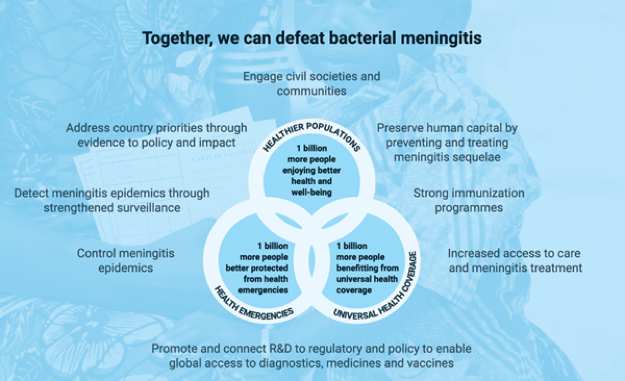Meningitis Vaccine Project
In 2001, as a response to Neisseria meningitidis serogroup A (NmA) epidemics, the Bill & Melinda Gates Foundation provided a ten-year grant to establish the Meningitis Vaccine Project. The Meningitis Vaccine Project (MVP) was created to overcome obstacles in developing an affordable and effective vaccine to eliminate epidemic meningitis as a public health problem in sub-Saharan Africa. These efforts led to the development of MenAfriVac®, the first meningitis vaccine made specifically for Africa and, starting in 2010, Burkina Faso was the first country to vaccinate people aged 1 through 29 years using the vaccine. To date over 300 million people have received MenAfriVac® across 22 countries and by 2020 the use of MenAfriVac® is expected to have protected more than 400 million people and prevented 100 million cases of serogroup A meningitis, 150,000 deaths, and 250,000 cases of severe disability¹.
To learn more about MVP visit http://www.meningvax.org/mission.html
Defeating Bacterial Meningitis by 2030 Roadmap
The Defeating Bacterial Meningitis by 2030 Roadmap was developed by the World Health Organization and partners to establish a global commitment to urgent and equitable action against bacterial meningitis. In 2017 there was a call from government representatives, global health organizations and networks, the private sector and civilians alike to establish a global vision and path forward to defeat bacterial meningitis. After two years of in-depth public and private consultations, the first ever global roadmap on overcoming the causes of bacterial meningitis came into existence.

Image Credit: WHO
The roadmap encompasses three main goals:
- To eliminate bacterial meningitis epidemics
- To reduce cases and deaths from vaccine-preventable bacterial meningitis
- To reduce disability and improve quality of life after meningitis due to any cause
Designated as a World Health Organization flagship global strategy, these goals will be achieved through five pillars: Prevention and epidemic control, diagnosis and treatment, disease surveillance, support and care for people affected by meningitis, and advocacy and engagement.